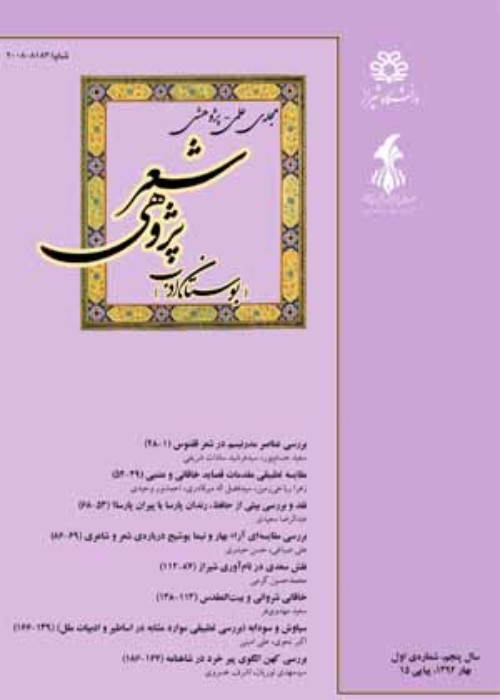Narrative and Qur anic Intertextuality in Ibn-e-Yamin Faryoomadi's Poetry
Author(s):
Abstract:
Intertextuality is a new approach in literary criticism. Intertextuality was proposed by Julia Kristeva in the late 1960s. Intertextuality believes in the constitution of each text from other texts whether contemporary or the ones created in the past; in other words، each text is intertextual. In Arabic literary criticism، it is called «contradiction» and because of the affinity between Persian and Arabic literatures، it can be considered as a good device of analysis for criticizing Persian literature. The linguistic and spiritual influence Ebn-e Yamin got from Quran and Tradition (Hadith)، especially from Emam Ali (PBUH) is very much detectible in his poems. This influence is the cause of different forms of intertextuality in his poems which are mostly created directly and consciously. The frequent type of intertextualty in his poems is «parallel negations» of which some are analyzed in this paper to emphasize the deep and inseparable connection of Persian culture and literature with Quran and Tradition.
Keywords:
Language:
Persian
Published:
Boostan Adab, Volume:5 Issue: 4, 2014
Pages:
91 to 108
magiran.com/p1233631
دانلود و مطالعه متن این مقاله با یکی از روشهای زیر امکان پذیر است:
اشتراک شخصی
با عضویت و پرداخت آنلاین حق اشتراک یکساله به مبلغ 1,390,000ريال میتوانید 70 عنوان مطلب دانلود کنید!
اشتراک سازمانی
به کتابخانه دانشگاه یا محل کار خود پیشنهاد کنید تا اشتراک سازمانی این پایگاه را برای دسترسی نامحدود همه کاربران به متن مطالب تهیه نمایند!
توجه!
- حق عضویت دریافتی صرف حمایت از نشریات عضو و نگهداری، تکمیل و توسعه مگیران میشود.
- پرداخت حق اشتراک و دانلود مقالات اجازه بازنشر آن در سایر رسانههای چاپی و دیجیتال را به کاربر نمیدهد.
In order to view content subscription is required
Personal subscription
Subscribe magiran.com for 70 € euros via PayPal and download 70 articles during a year.
Organization subscription
Please contact us to subscribe your university or library for unlimited access!



